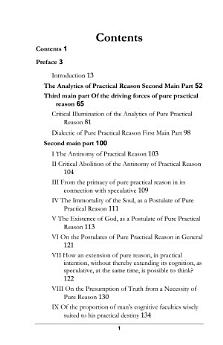Critique of Practical Reason
2024年5月 · Minerva Heritage Press
電子書籍
108
ページ
family_home
利用可能
info
report評価とレビューは確認済みではありません 詳細
この電子書籍について
A new translation of Immanuel Kant's famous "Critique of Practical Reason", one of his three core critiques, from the original German manuscript first published in 1788. This new edition contains an afterword by the translator, a timeline of Kant's life and works, and a helpful index of Kant's key concepts and intellectual rivals. This translation is designed for readability, rendering Kant's enigmatic German into the simplest equivalent possible, and removing the academic footnotes to make this critically important historical text as accessible as possible to the modern reader. Kants 1788 Critique of Practical Reason is the second of his major triad of critical philosophical critiques. It builds upon his Pure Reason and the Groundwork for the Metaphysics of Morals in delineating his theory of moral justification. The Critique of Pure Reason answers the question, "What can I know?", while Practical Reason answers "what should I do?". Practical Reason primarily concerns the relationship of Reason to morality. It is the Imperative in the Categorical Imperative. Morality is not a feeling or perception, but a reality to submit to. Kant's Practical Reason is a critical text to understand the view of Reason as Teleological, a uniquely German view, in contrast to the English Empiricist view (Hume, Locke, and Descartes) view is that Reason is the slave of the passions and can tell us nothing about morality and ethics. The teleological view, which is found clearly and explicitly in Kant and all German Idealists after him, is both normative and descriptive, or in other words, Imperative. The entire Frankfurt school of thought operates off of a version of this metaphysical view, all the way to Theodor W. Adorno's Aesthetics which is rooted in a Teleological view of reason.
著者について
Immanuel Kant (1724-1804) was a German philosopher whose work in epistemology, ethics, and metaphysics shaped the course of Western philosophy. In his landmark work, Critique of Pure Reason, Kant proposed "transcendental idealism," asserting that human knowledge is limited by the mind's structures, which mediate our understanding of reality. This "Copernican revolution" in philosophy argued that we can only know phenomena (appearances) and not noumena (things-in-themselves). In Critique of Practical Reason, Kant introduced the "categorical imperative," a foundational principle in ethics that calls for actions to be universally applicable. Kant's focus on autonomy, moral duty, and rationality laid the groundwork for modern ethical and political thought, and his ideas continue to influence fields such as philosophy, law, and cognitive science, positioning him as a central figure in the Enlightenment.
この電子書籍を評価する
ご感想をお聞かせください。
読書情報
スマートフォンとタブレット
Android や iPad / iPhone 用の Google Play ブックス アプリをインストールしてください。このアプリがアカウントと自動的に同期するため、どこでもオンラインやオフラインで読むことができます。
ノートパソコンとデスクトップ パソコン
Google Play で購入したオーディブックは、パソコンのウェブブラウザで再生できます。
電子書籍リーダーなどのデバイス
Kobo 電子書籍リーダーなどの E Ink デバイスで読むには、ファイルをダウンロードしてデバイスに転送する必要があります。サポートされている電子書籍リーダーにファイルを転送する方法について詳しくは、ヘルプセンターをご覧ください。








